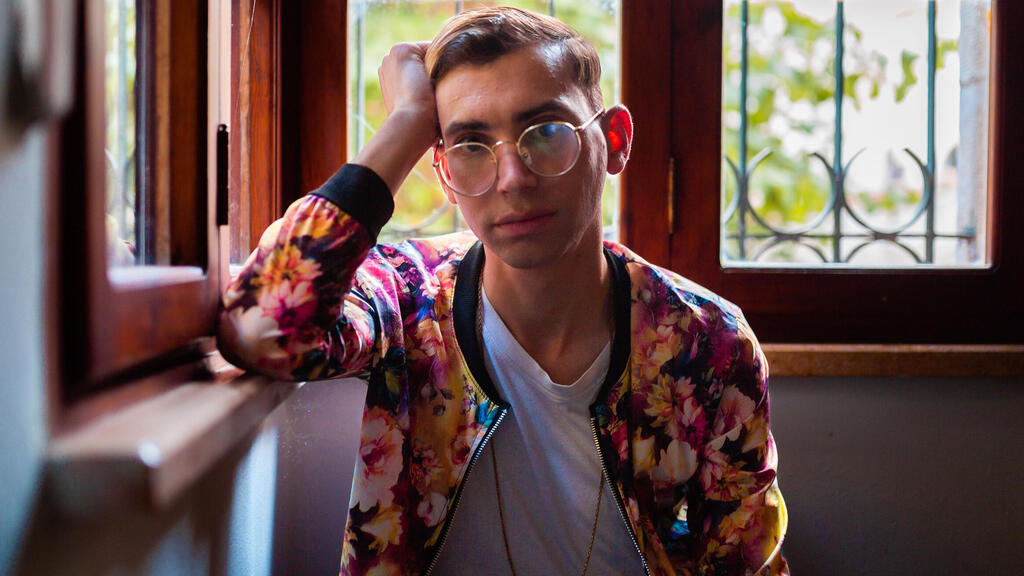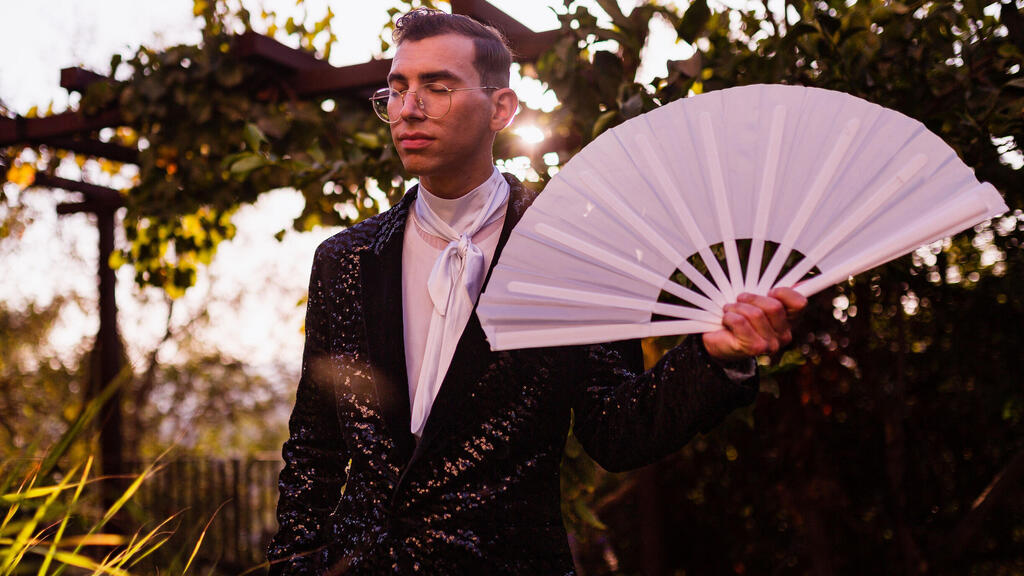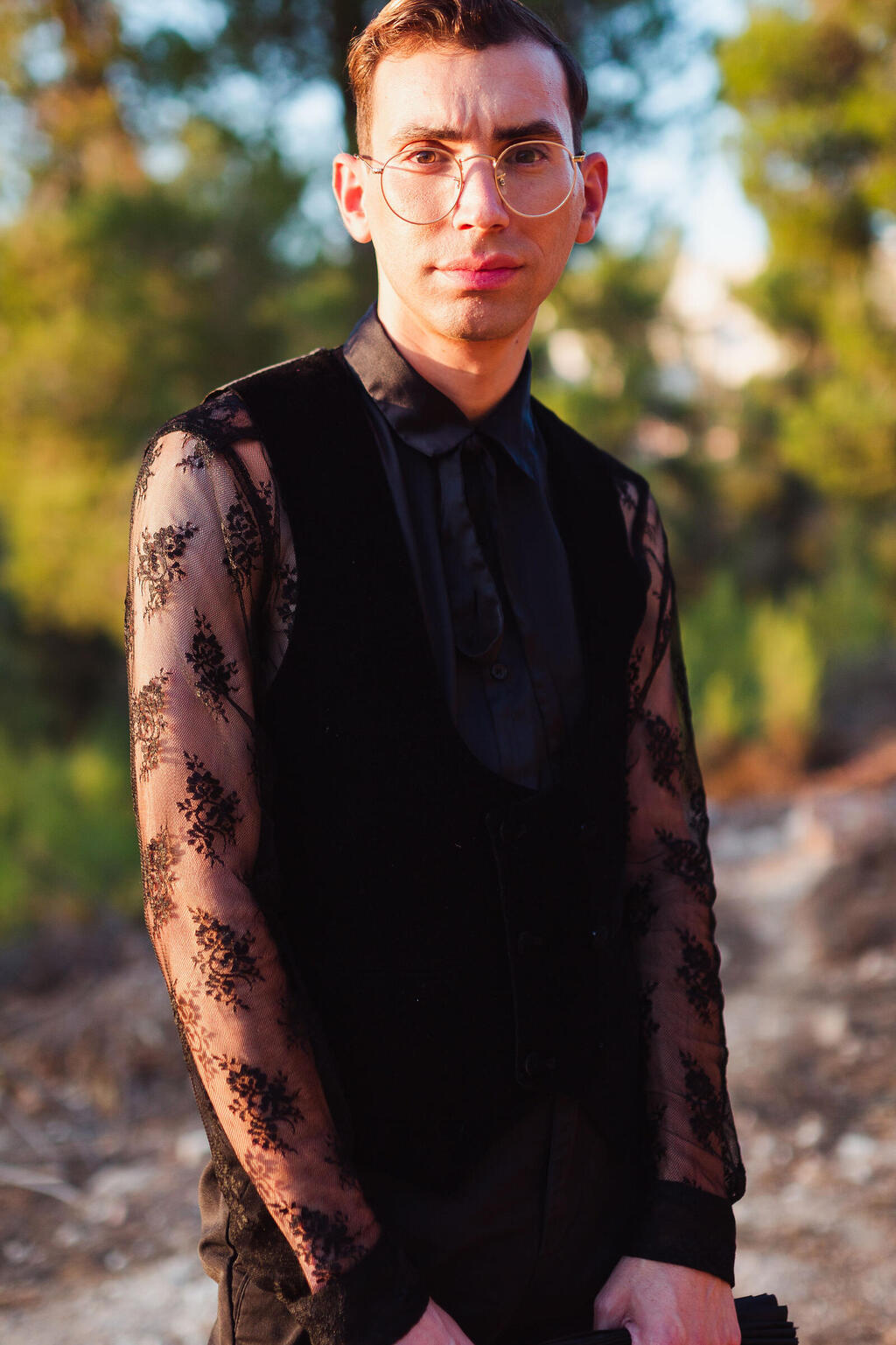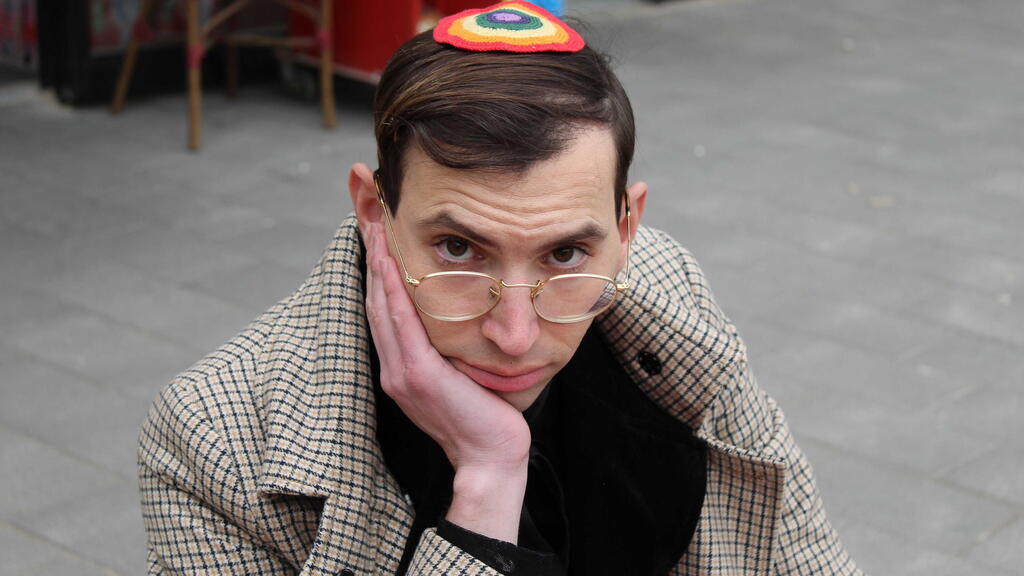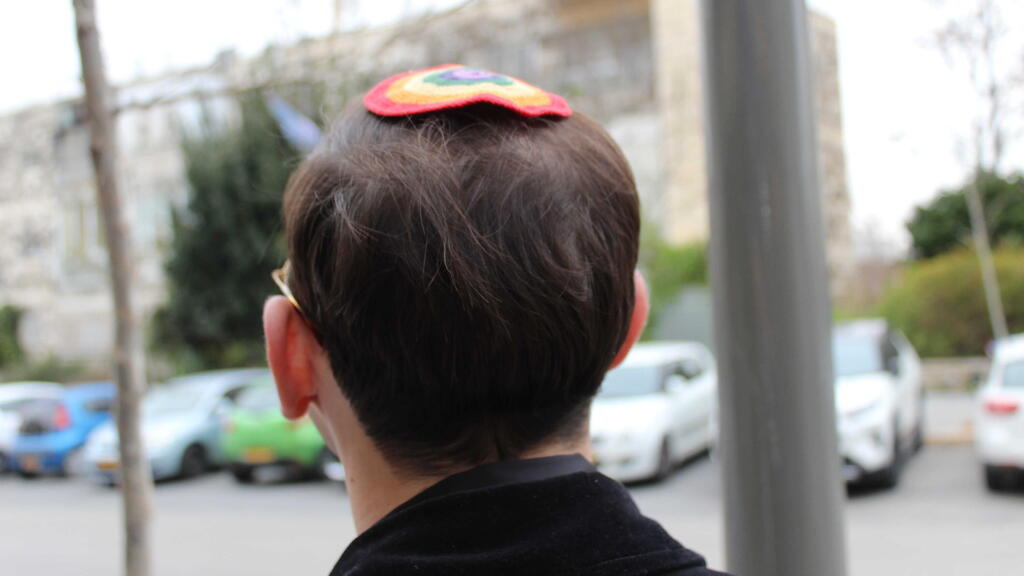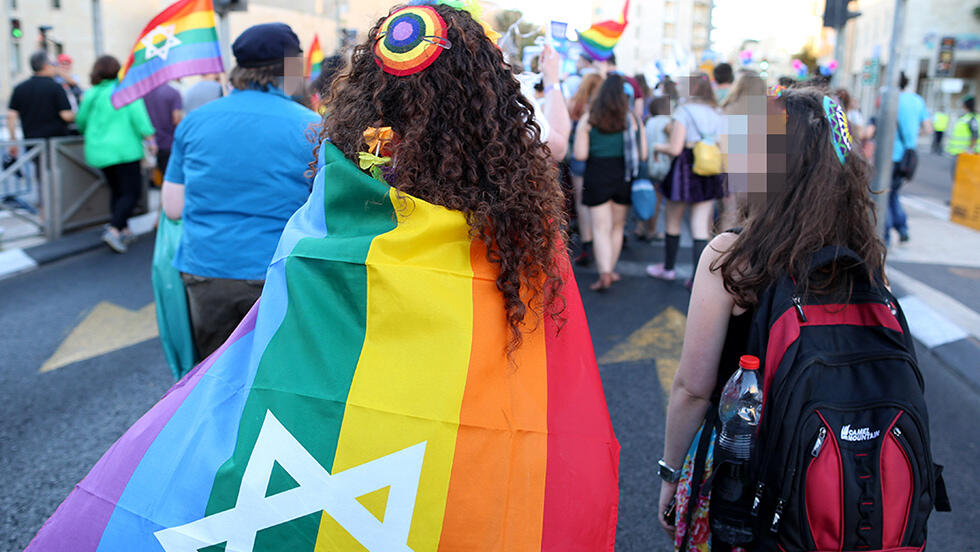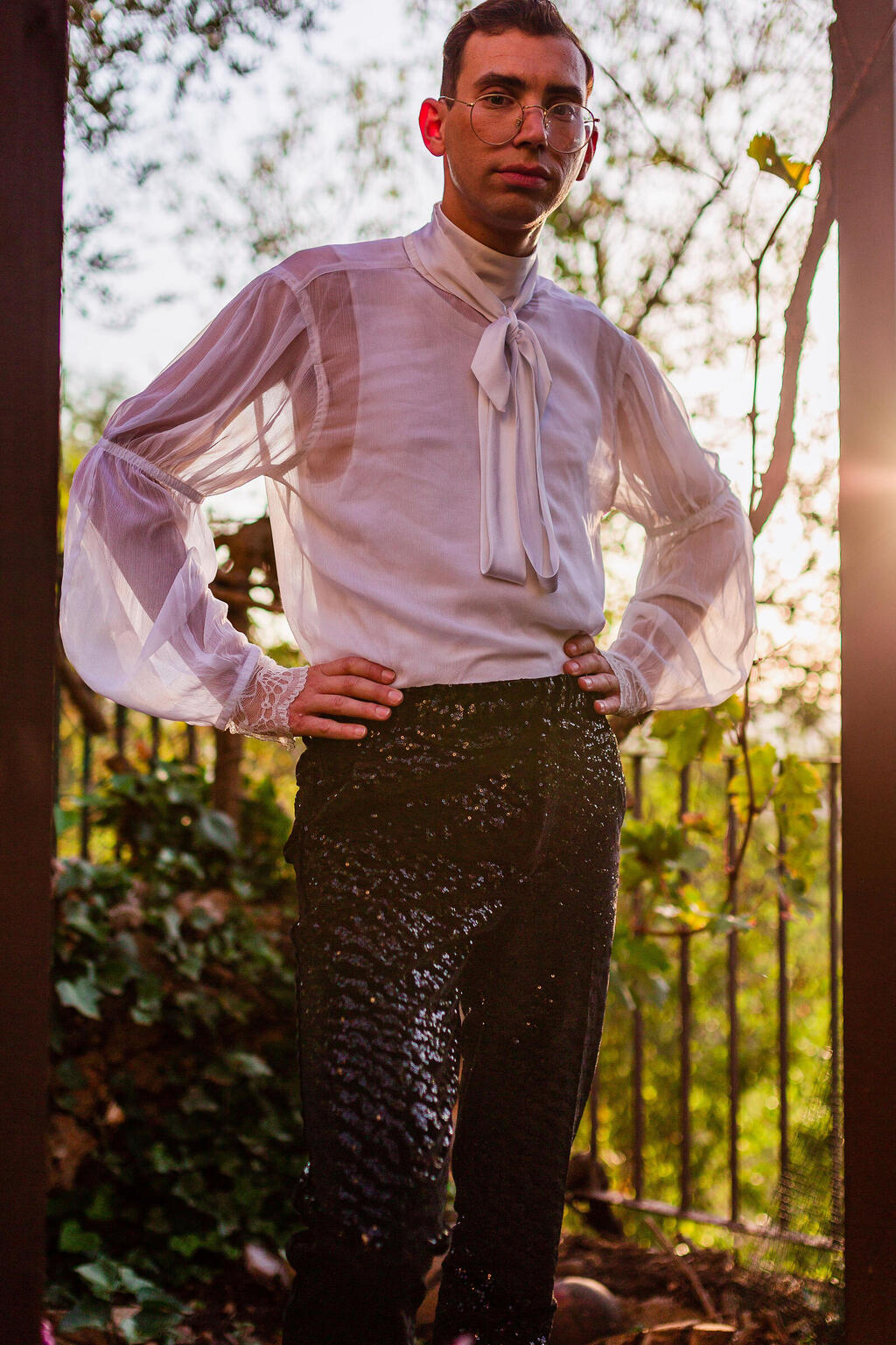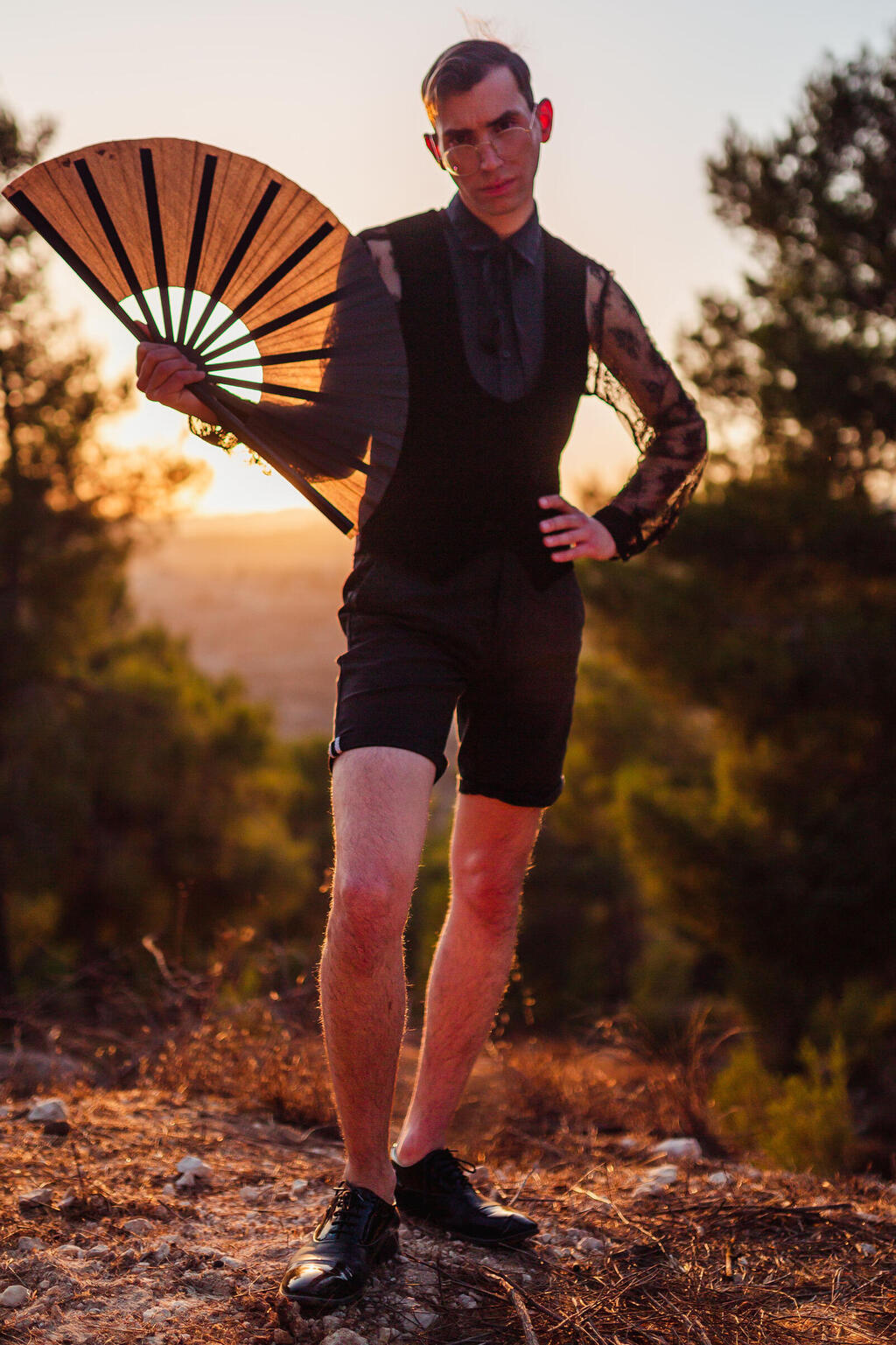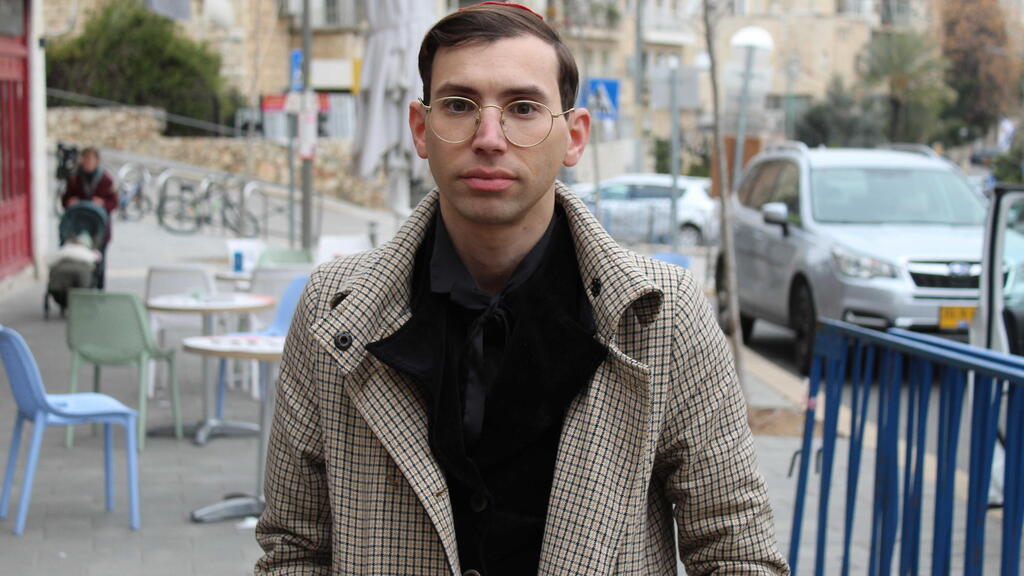Yitz was born 30 years ago but has decided to celebrate his 28th birthday this year.
"I came out at the age of 27 and I feel I missed out on my 20s because I wasn't living as who I really was," he says, wearing a knitted kippah in the rainbow colors of the pride flag. "Unlike a lot of gay people in the closet that I see on gay dating apps, I didn't lead a double life. I knew full well I was gay, but I wasn't prepared to face the consequences.
"I was freaking out about turning 30. I'm a very ambitious and competitive person. I'd always dreamed of being on Forbes' 30 under 30 list, and that wasn't going to happen. I sent friends invitations to my 28th birthday from my apartment in Jaffa. Most of my friends know that isn't my real age. It was a bit of a joke. My friends from work don't know."
Why did you only knock off two years? Why didn't you say 25?
"No, no. Let's not get carried away. Two years here or there I think is an elegant solution. I look 28. Although I've come a long way over the past two years, I wanted to delete the COVID years."
Falling in love with a male work colleague
It's hard to describe Mandel's dramatic transformation over the past three years – from a closeted gay man who was embarrassed about telling even the people closest to him about his sexual orientation, with exceptional frankness, publicly sharing details of his personal life.
An episode in Yitz's online series airing on Israeli Public Broadcasting Corporation KAN DIGITAL titled, "What's wrong with me," portrays a scene - based on a real incident - in which Yitz is in love with a male work colleague.
"There's a straight guy at work that I'm in love with. Everyone apart from him knows. That episode is totally based on a real story. I just cast a different work colleague for the role. The great thing about where I am now is that I know it's over. I can move on and fall in love again."
From Talmud Torah to national-religious high school
Yitzhak Mandel is the youngest of five in his family, which consists of two girls and three boys. They're all religious. His parents were born and raised in the United States, became religious and made Aliyah to Israel in 1985. Over the years, his father became ultra-Orthodox and now lives a Haredi Lithuanian (Misnagged) lifestyle. He currently serves as a rabbi at a well-known Jerusalem yeshiva.
His mother didn't adopt the Haredi lifestyle, but rather remained national-religious "wearing a partial head-covering with a little hair poking out, a denim skirt and sneakers. My parents lived with these differences but my father usually had the upper hand so we were sent to Haredi schools. I wore a black kippah. At home, our kashrut was Mehadrin, and mixed swimming was out of the question."
As a young boy, Yitz attended the Haredi Talmud Torah. Most of the boys, however, were national-religious. "Together, we attended the national-religious Ezra youth movement. By the end of ninth grade, I asked my father to let me go to a national-religious high school rather than the Haredi Yeshiva Ktana ("Yashak"). I realized that I wanted to be national-religious and not Haredi. The only place my father agreed to was the national-religious yeshiva high school in Jerusalem. "Jerusalem Yeshiva for Youth" ("Yashlatz"), on the more Haredi end of the national-religious community ("Hardal").
Was it here that you came across Hanoch Daum's writing?
Actually, yes. I didn't read what he'd written, but I heard about his book ("God doesn't allow it"), where he recalls sexually experimenting with a youth. Like the boys around me in ninth grade, I was repulsed by it. I wasn't even curious. I developed an aversion."
After two years at Yashlatz, he transferred to Yeshivat Horev where he graduated high school. He went on to the Hesder Yeshiva at Otniel - an Israeli yeshiva program that combines advanced Talmudic studies with military service in the IDF - serving in the Education Corps as his military profile didn't qualify him for combat service.
For years, Mandel repressed his sexual orientation, but he now recalls that he was aware of it by the age of 11 or 12. "I remember walking around the forest in the youth movement, looking at the other boys and realizing that I was different. I was very fearful of this realization, but I told myself that I didn't have to deal with it right there and then, but only when I grew up, so I wouldn't have to share it with my parents. I was very wary about telling them, especially my father, but there was no doubt in my mind that I like men and that I'm not attracted to women."
My parents were the only surprised ones
Three years ago, he realized that he had to let it all out. "It was the seventh night of Passover. I went to the forest near my house and read Psalm 27 ('A psalm to David. The Lord is my light and my salvation'). I cried and cried and pleaded with God to be with me and that he should protect me.
“I went back home. My parents were in good spirits and I knew that I was about to break their hearts. I told them that I had something to tell them. My father gazed at me. I tried breaking it to them gently. 'Have you noticed I've been depressed lately? Have you noticed that I'm single and I've never had a girlfriend?' That didn't work. So, I simply told them that I'm attracted to men.
His parents' stunned response to the disclosure surprised him. "I assumed they suspected. When I told other people, no one was surprised," he says with a smile.
"As a child, I loved modern dance and wearing dresses... you know. As a youth, I'd go to the burger joint and tell people that I liked some girl because I didn't want to be different, but overall, I'd say I was never in the closet – I was in a sort of showcase window," he says, pointing at a glass cabinet display case.
“When I told my father I was gay, he said to me: 'You know, there's a cure for it.’ He suggested I undergo conversion therapy. I simply refused. I told him that he had no idea how much suffering it causes and quite how it just doesn't work, and that I'd never do it. That was the first and last time he suggested it.
“It's important for me to say that I grew up in a great home environment with warm and loving parents. Despite all the differences of opinion, they love, respect and support me. When I came out, nothing changed in that respect. They're also very supportive of my work and our relationship is very good."
Much more than just sexual urges
Two or three months after he came out to his parents, his father told him about an organization that matches up religious gay men with religious lesbian women. “'You can build a family and you'll have children,' he told me. 'You can find someone who likes singing as you do... you know, sex isn't that important in a relationship.' I replied: 'Dad, you can't say stuff like that to me. I'm 27. It's just not true.’"
His father, however, hasn't tired of trying to fix him up with a lesbian. "It comes up every few months," he smiles. "At some stage, he said to me: 'Even if you get married and get divorced, your children will know that you were together.' His intentions aren't bad. He just thinks that my life will be simpler that way," he adds.
"I think a lot of religious people feel that homosexuality is about sexual urges, but they don’t see it as self-expression. They don’t understand the falling in love side of it, issues of how you want to live your life and who you want to live your life with."
You spent years in the closet in the religious school system. Did any of your teachers push for conversion therapy?
“In eleventh grade, the homeroom teacher at Horev Yeshiva held individual conversations, 'identifying' the gay guys in the class – there were a few – and he sent them for conversion therapy. I have a good friend who only now finished an eight-year stint in conversion therapy.
"I was spared. The rabbi asked me if I wanted to be a woman. I told him I didn't. He asked me if I trim my eyebrows, why I talk the way I do and whether I want to change it. I just closed up, went quiet, kept my head down and waited for it to pass… I think he knew but didn't manage to get out of me why he needed to send me for conversion therapy as he did to other guys."
Your friends who were sent to conversion therapy, how did that impact them?
“All three were deeply damaged by it. It made them hate themselves, even bringing on suicidal tendencies. It's a really terrible experience, thank God I didn't have to go through it."
I wouldn't want my son to be gay
Mandel explains that for years, he just wanted to be straight. "I think a lot of LGBTQ people can identify with this. For me, it was never a choice. I know it's not politically correct to say, but I wanted to be straight.
“Nowadays, we all want to say that we're proud of what we are and happy with it, but even now, I can state clearly that I'm not happy I'm gay. It's complicated… I'm out now and I very much know what I am and I'm proud of it, but I wouldn't say it's straightforward. I wouldn't want my son to go through all of this. It sounds harsh, but for him, for his own good... maybe things will be different by then…"
Was there a time you asked yourself why you needed the whole religious framework?
He pauses to think. "Yes, I must say that I don't completely identify with mainstream Orthodox Judaism. Maybe it's not for me to say, but there are a lot of Halachic things I don't like, not just about homosexuality but, for example, also about the position of women.
“I go to an Orthodox synagogue because it's near my house, but when I was in Jerusalem, I used to go to the egalitarian 'Kehilat Zion' synagogue, under Rabba Tamar Elad Appelbaum – a community which describes itself as 'Eretz Yisraelit' (The Land of Israel). I didn't tell my father. If he'd have known which synagogue I was going to, he would have rather I didn't go to synagogue at all. There's mixed seating, women are called up to read from the Torah, etc. On Yom Kippur, they omit the verse about having 'sexual relations with a man as one does with a woman.’"
More conservative religious people would say "If the Torah is eternal, how can you omit verses?"
"That's exactly the conflict. It's problematic, but that's what we need to be doing, examining how we retain the commandments, the mitzvahs and our traditions that we love, while in keeping with the Western values in which I believe. At the end of the day, I believe in equality, pluralism and progress. Reconciling the two worlds isn't easy.
“It's fashionable these days to frame things in dichotomic terms, as a struggle between Conservatism and Progressivism. Religious gay people are saying that they're not willing to renounce either side. Why should I renounce my tradition? It's mine, I grew up within it. No one has rights to Judaism or God. You can say that I'm a sinner. You can say that I don't keep all 613 mitzvot, but who does? So yes, some parts of Halacha are difficult for me, but there are some marvelous things and it's part of who I am, so I'm not throwing out everything. I chose to live with this complexity. I can't solve all the contradictions. What I can do is raise the subject and think about it," he says.
Do you go to the Pride Parade?
"Yes, in Jerusalem. I went to the parade in Tel Aviv for the first time last summer. I always said that I don't really feel comfortable at the Tel Aviv parade. The Pride Parade in Jerusalem looks more like a protest march, while the one in Tel Aviv is a party. It was great and I enjoyed myself, but it was a party. If you go to the parade in Tel Aviv, you might be mistaken into thinking that it's all good for gay people – dancing on floats and having a fabulous time and that we can lay the issue to rest. But that's not the case and the revolution is not yet complete. Life isn't full of spangles. Being different is still complicated – even in 2022."
Bringing home a partner would be a "tsunami"
He's also critical of certain things that go on in the gay dating world. "I find the Tel Aviv LGBTQ scene hard to handle because I feel that it focuses too much on sex. It's all about sex and body image. Conversations on dating apps go straight to sex. I think it oversimplifies gay identity. It's much more than sex."
Reading between the lines, it looks like you're looking for a serious relationship
“Yes, very much so. Ideally with someone religious, so we can have a religious home together, but I'm not writing off secular guys. The religious gay scene is relatively small... "
He is yet to bring home a partner to meet his parents. "When I have a serious relationship, I'll have another struggle with my parents. Bringing home a man isn't something I see happening anytime soon. Let's just say that if my coming out was a wave, bringing home a man to marry – would be a tsunami, but I do want it and I'm ready for the challenges it'll pose. We'll cross that bridge when we come to it."
In recent years, on the fringes of the national-religious community, pockets of opposition to the gay community have developed – primarily within the Noam political party.
"I find it very disturbing. As a minority, there's always the fear that your freedom will be curbed. Civilization can regress. Although in recent years, there has been more acceptance and understanding within the religious community, I fear there'll be a relapse. I have friends, and even family members, who voted for parties running with Noam in elections on the list - calling itself the 'Religious Zionist' party. I felt personally hurt and disappointed by anyone who voted for them."
Someone wrote "You make me sick"
He shares a Jaffa apartment with two female roommates. One is formally religious and the other grew up in a secular home, but they're both vegetarian, which makes the kashrut issue easier. "I'm very connected to my Jewish identity. I love my Judaism and I've never distanced myself from it. I've had doubts, but I still have a very close relationship with God. I find it hard to listen to people talking in God's name and claiming to know how he thinks we should behave. God is in my life. For better or worse, he will always be in my life."
For worse – because you feel you displease him?
"I used to feel that I was sinful by nature, that something was not right with me. I felt impure, dirty."
Do you feel you're being pressured to choose between various aspects of your identity?
"Definitely. Yes. Even I get confused myself sometimes, asking myself whether I’m more gay or more religious. This conflict is profound. live this complexity so it doesn't surprise me when people can't really get their heads around it."
Do you also get offensive comments?
"There are some really nasty comments. I've learned not to take them seriously. I’m much more scared of actual criticism. People write things like ‘You're cute 'n’ all, but you're not saying anything…' Someone once wrote: 'What was that I just watched?' I basically feel that there'll always be homophobic comments.
“We're in 2022. Especially if you live in Tel Aviv, you'd be sure that we've progressed – there are gay politicians and prime time television presenters - but in the comments section of my 'What's wrong with me' episode which examined why I can't dance freely when I'm sober, someone wrote: 'You make me sick.'
"Someone else wrote: 'Why do we have to see this? It ruins the young people.' There's a scene where I imagine how my straight love interest and myself are about to kiss – which evoked tumultuous feedback, mainly because of the heavy focus on my kippah. But I’m not here to cause trouble. When I go out on a date, that's what I look like. I wear a kippah and I wear sequins. That's what I am. This is my life."
I don't send my father my video clips
Mandel sometimes feels he goes too far with the exposure – possibly as compensation for the years of silence - but he does his best to be aware of it. He presents his personal problems in an internet series, peppered with humorous self-deprecation "because that's how I live my life. I've always dealt with difficulties by laughing at myself. It's a bit Woody Allen. I've been told I'm very neurotic. I really like Larry David's show 'Curb Your Enthusiasm.’"
While studying philosophy at the Shalem Center, he enrolled in a screenwriting course at the Sam Spiegel Film School in Jerusalem. He started out two years ago at Kan as a researcher. He'd show up at Kan once a week and began seeing how the industry works, meeting people such as Lucy Ayoub, Tamir Bar and Melech Zilbershlag - who later became stars.
One day, he was offered the opportunity of presenting a series called 'Lo Ma'aminim' ("I can't believe it"), showcasing stories of individuals with exceptional characteristics, from the man with the longest mustache in the world to the man who is allergic to water. Mandel immediately accepted. "I can't cash out yet. My dream is hosting Eurovision," he jokes. "I'm interested in presenting and in journalism. I'm an ecology nut. I'd also like to write and star in a TV series about myself – a kind of story about overcoming hurdles connected to coming out of the closet and the search for love."
In one of his videos, he tells the story of Gad Bek, a homosexual Jew in Nazi Germany. Bek was a founding member of the Pionier-Kreis underground organization, which operated in Nazi Germany during the Holocaust. Bek helped youngsters evade being sent to concentration camps and utilizing his connections with non-Jewish homosexuals, he helped smuggle food to Jewish hiding places.
"That was the first time I publicly addressed the subject. I'd always wondered what would have happened to me as a homosexual Jew if I'd been alive at the time of the Holocaust. I found it very interesting. I didn't send that clip to my father either. I didn't want to upset or offend him. I've sent him other clips I've made though, and he's very complementary."
If I have to select "man", "woman" or "other", I'll choose "other"
As a form of therapy, Mandel is very occupied with his own shortcomings. "Discourse has an enormous potential to heal and build. For over 15 years, I lived with a secret that I kept inside, that I couldn't share with anyone. It damaged me. When I came out of the closet, I felt like I came out of all the closets. My biggest secret is out there. All the rest is fries."
His unique fashion choices are also prominent in his videos, invariably including clothes generally perceived as women's clothing. "I think a lot of people have trouble accepting me because of my queer look. I don mascara and eyeliner and I wear lace. I think the gender blurring is what puts a lot of people off, especially more conservative people.
“If I'm filling in a form and I have to choose whether I'm 'man,’ 'woman' or 'other,' I'll choose 'other.' I feel I have gender fluidity. I mean, I'm a man and I'm OK with that, but I've definitely got some feminine sides – and I don't feel it's something I need suppress or be ashamed of."


